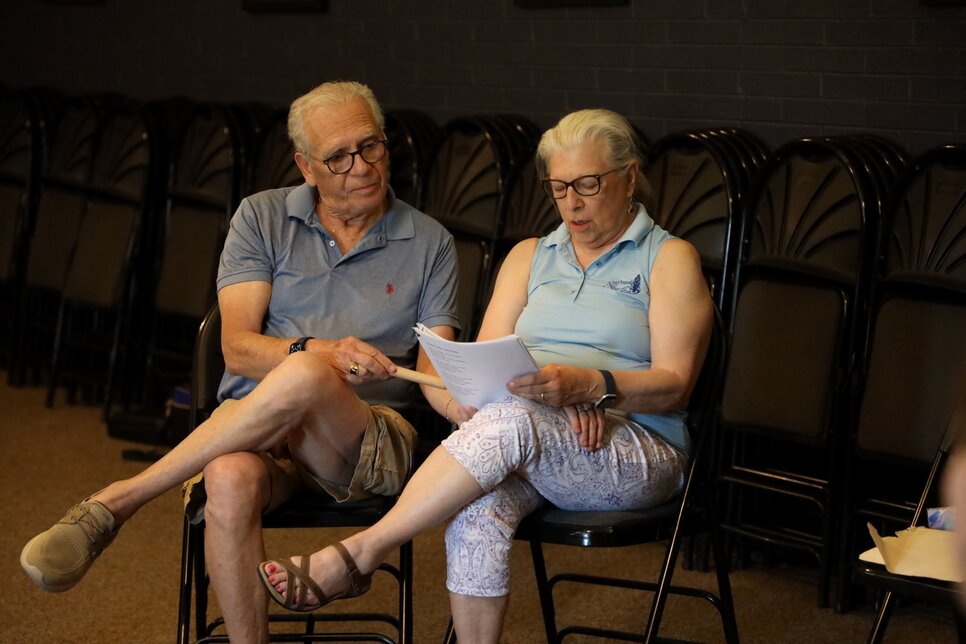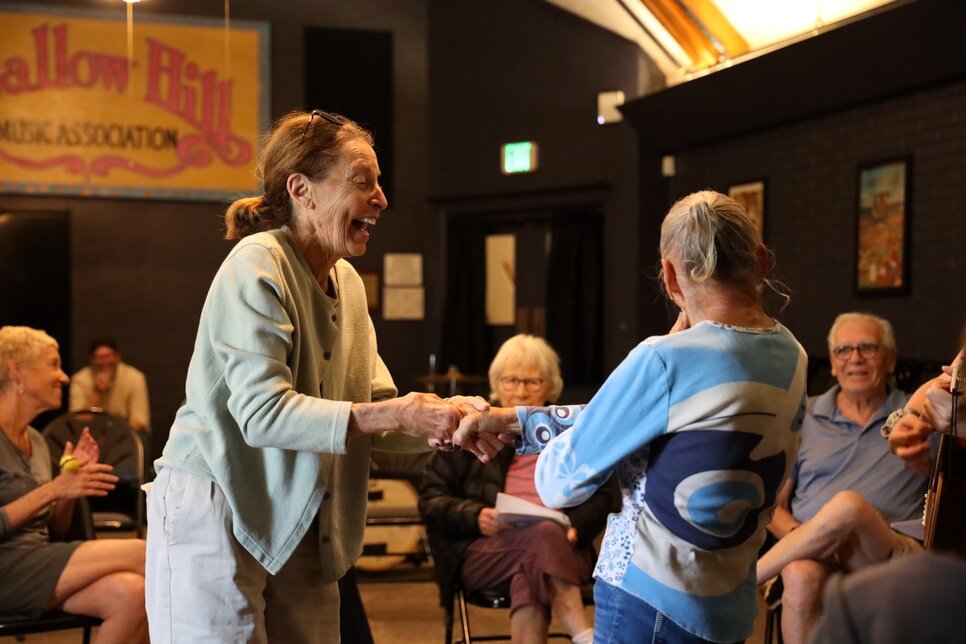Music therapy brings comfort and community to people with memory loss
share

DENVER — Chris Smith loves to sing. She’s spent several decades singing in church and synagogue choirs.
Sitting next to Rick Smith — her husband of 44 years — in the chapel of a converted church-turned-music school, Chris sang along to John Denver’s “Take Me Home, County Roads” while Rick kept the beat with a güiro (a wooden percussion instrument) shaped like a frog.
Chris has dementia. This was her and Rick’s first time at Musical Memories, a free music therapy group for people with memory loss and their caregivers.
“Music is really powerful in the brain,” music therapist Kristen McSorley said. “It is stored more deeply in our memories and is also stored across the brain. Whenever you listen to music, it can activate neural networks throughout the brain that have perhaps been lost due to some memory loss.”
You can listen to an audio version of this story in the player below.
Swallow Hill Music holds the drop-in group on the first Friday of the month, scheduled to coincide with the First Friday events held in Denver’s Santa Fe Arts District. Swallow Hill Music is a nonprofit based in Denver that offers music classes, concerts and outreach programming.
While Swallow Hill offers individual music therapy sessions, the free group sessions are an opportunity for people to try out music therapy as a method of care while connecting with people going through similar experiences.
“It's a way to get them back into a community space and to connect with other folks that have memory loss,” said McSorley, one of the group’s rotating instructors.
These connections are important for participants to build social bonds and feel less alone in their experience. But they are also a tool for caregivers to share information about resources or events available in the area for people experiencing memory loss.
Throughout the hour-long session, McSorley played the guitar and led the group through about 10 songs — including a rendition of “Happy Birthday” in celebration of one participant. Between songs, McSorley posed casual questions — like asking where they’re from or what they’re doing that weekend — to prompt conversation among the group.
Since it’s a group session that takes place just once a month, McSorley said the goal isn’t to dive deep into unpacking individual emotions but rather to create a positive space where participants can process their emotions and find community.
But that doesn’t mean emotions don’t come up, McSorley said.
“For caregivers, some of the songs can really bring up a lot of emotions, and they'll have some tears,” McSorley said. “They don't always share about what's going on, but I think it's still a way of connecting with their loved one that they don't always get to do.”
McSorley said that she typically sees about four to 10 people at each session. On the day that Rocky Mountain PBS visited, 14 people participated in the group – including several new faces like Chris and Rick Smith.
“It was nice to see a smile on my wife's face and see her singing and participating,” Rick Smith said. “She can look withdrawn, but it's progress.”

Rick Smith suggested he and his wife, Chris, join the Musical Memories class because Chris loves to sing, and Rick loves to see his wife smile.
Photo: Carly Rose, Rocky Mountain PBS
Photo: Carly Rose, Rocky Mountain PBS
Music can be a helpful therapeutic tool because, as McSorley puts it, “music holds the space and hugs you while you are going through whatever you're going through.”
Music is also a powerful tool for memory. There’s a reason why many of us still find ourselves singing the alphabet song to remember what letter comes next.
For people experiencing memory loss, music can be especially comforting because it’s still familiar, even as their memory declines.
“When people have dementia, they're often worried, like, ‘What am I doing next? Where am I? I’m confused,’” McSorley said. “When they're singing a familiar song, their emotions become more regulated and grounded in the moment.”
There are a few songs that McSorley said she always plays during a session – like The Beatles’ “Here Comes the Sun” – but mostly she takes requests from participants about their favorite songs. People usually request songs they listened to when they were younger, which McSorley said are often stored deep in the brain’s long-term memory.
“Feeling empowered that you still are able to remember the words to the song and that you still are able to engage with some memories that maybe you had forgotten, those are some really powerful things,” McSorley said.
“I think having a space that you are succeeding in is really important for folks,” she said.

Doris (left), a first time participant in the group, joined long-time attendee Sandy (right) for a dance in the middle of the circle during Elvis Presley’s “Hound Dog.”
Photo: Carly Rose, Rocky Mountain PBS
Photo: Carly Rose, Rocky Mountain PBS
Participants are encouraged to sing along, and McSorley handed out printouts with the lyrics to each song. Some choose to stick to the maracas or mini bongos, while others hop into the middle of the circle for an impromptu dance party.
Any level of participation is beneficial, McSorley said, as long as people feel like they’re a part of it. Chris Smith said she could remember the words to most of the songs, which made the session fun for her.
“It makes me feel happy when I can see my wife being happy and comfortable in the crowd,” her husband, Rick, said.
Susan Fein has taken her mother, Elaine Fein, to the group a few times. Susan said she enjoys seeing her mother socialize with other people at the class. While getting her mother to come to the group can take some convincing, Susan said once she’s there, she can tell she enjoys it.
“It makes me feel alive,” Elaine Fein said about the group. “You get to be my age, you feel down. This makes you feel up for a while.”
